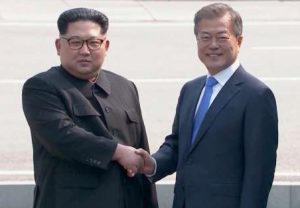North Korean defectors urge President Trump to raise human rights with Kim Jong-un
For ten unbearable months, Jung Gwang Il was hung upside down or waterboarded until he confessed to being a spy. He was then forced into hard labor at North Korea’s notorious Yodok detention camp for another three years.
“In that first ten months, I dropped from 75kg to 36kg,” he said. “In camp 15 I worked from 4am to 8pm every day, either logging or farming maize. We were given daily three lumps of corn mixed with beans, and slept on the floors of tiny cells crammed with 40 prisoners.”
Jung survived and escaped to South Korea in 2004. On Saturday he, and other North Korean defectors, expressed sorrow that their homeland’s ongoing dire human rights situation was ignored in an unprecedented summit between Kim Jong-un and South Korean President Moon Jae-in.
Jung plans to appeal personally to US President Donald Trump to raise human rights violations at his own summit with Kim in May or June. Jung, who represents the Association of North Korean Political Victims and their Families, once smuggled flashdrives of a Trump speech denouncing North Korean “tyranny” into the reclusive state. The president thanked him for doing so when the two men met in the White House in February.
A second meeting is slated for May. Mr Jung will give the president the names of ten North Korean prisoners, urging him to ask Kim for their release.
[The Telegraph]

 The leaders of North and South Korea embraced on Friday and pledged to work for the “complete denuclearization of the Korean peninsula” on a day of smiles and handshakes at the first inter-Korean summit in more than a decade.
The leaders of North and South Korea embraced on Friday and pledged to work for the “complete denuclearization of the Korean peninsula” on a day of smiles and handshakes at the first inter-Korean summit in more than a decade.